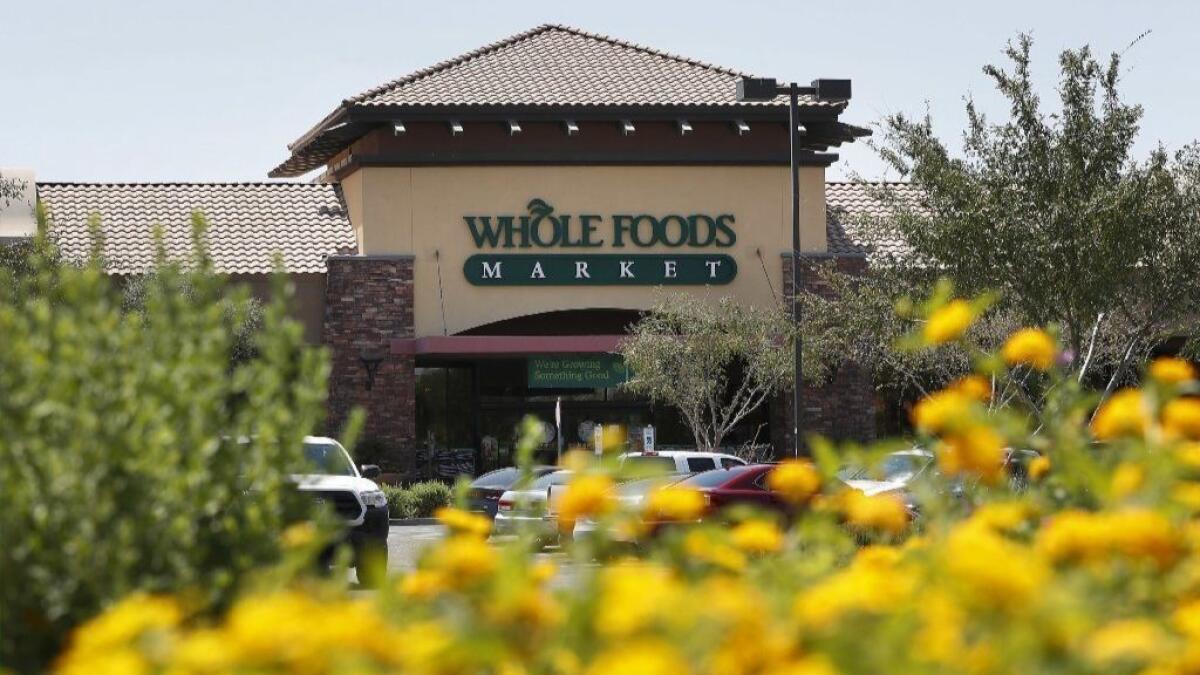On the Record: How Whole Foods has affected the grocery business one year after the Amazon deal

- Share via
It’s been more than a year since e-commerce giant Amazon.com bought Whole Foods Market Inc. for $13.7 billion, a deal many expected would upend the grocery industry, especially in the hotly competitive Southern California region.
Given Amazon’s record of aggressively using lower prices, technology and vast, efficient distribution to revolutionize retail sectors such as books and electronics, there was speculation Amazon would have the same effect on grocery sales. For instance, Amazon rolled out free two-hour delivery of Whole Foods products to Amazon Prime members in April and four months later added curbside grocery pickup at Whole Foods stores.
But the merger hasn’t yet set off a major transformation of the industry, although Amazon’s arrival has sparked some changes both at Whole Foods and its rival supermarkets, according to Burt P. Flickinger III, managing director of Strategic Resource Group, a retail consulting firm.
Flickinger is a longtime observer of the grocery business, especially in Southern California, and his analysis has included a detailed look at Whole Foods before and after the Amazon deal.
Whole Foods helped pioneer the large-scale selling of natural and organic groceries, and its 465 stores include 85 in California. But it’s still a niche player, with only 3% of the Southern California market, and the chain had been struggling when Amazon swooped in.
At the same time, Amazon Chief Executive Jeff Bezos is famously patient, rarely making radical changes in the immediate aftermath of a purchase.
We asked Flickinger — who, in full disclosure, owns small stakes in Amazon and several grocery and drugstore chains — to review what’s happened so far. Here’s an excerpt that’s been edited for space and clarity:
Whole Foods is dubbed “Whole Paycheck” because of its relatively high prices. What’s happened with prices at Whole Foods since Amazon took over?
To Amazon’s credit, they’ve had a few price reductions, including for Amazon Prime members. But Amazon has not, to this point, been able to leverage its size, scale, skill in procurement and buying power to effectively lower prices much.
So, shopping at Whole Foods is still more expensive compared with the so-called legacy chains such as Kroger Co., which owns Ralphs and Food4Less, and Albertsons Inc., which also owns Vons and Pavilions?
Yes. If a family of five in Southern California is spending an average of $100 a week, or $5,200 a year, at those legacy grocers, the price paid to do the same shopping at Whole Foods would be between $1,500 to $2,500 higher per year, and it would be $5,000-plus higher per year for families that spend $10,000 per year.
Is that partly because the legacy grocers cut their prices once they realized Amazon was jumping into the market?
Yes. The Southern California grocers lowered prices in anticipation of Amazon buying Whole Foods after the merger was announced in June 2017. And the legacy grocers already had been stocking their shelves with more of their own natural and organic groceries to compete with Whole Foods and others.
That means competitors in Southern California are now eclipsing Whole Foods and what had been Whole Foods’ power alleys of strength.
We hear about advances in home delivery of groceries and other innovations at Whole Foods and other markets. But you’re saying price is still what matters for many families?
People like Whole Foods; there are still highly motivated Whole Foods shoppers. But overall it’s an economic decision, especially in Southern California. With the cost of living so high there, saving money on food is one of the only ways to make it, economically.
Working people and poor people and seniors and people on fixed incomes, especially in Southern California, can’t afford the premium prices at Whole Foods even after Amazon bought them.
Amazon’s record speaks for itself. Do you expect it still will make waves in the grocery sector with Whole Foods?
In my professional view, Jeff Bezos is the most brilliant individual in American business in 100 years. Bezos will transform it and make it one of the best grocery retailers of any kind. They’re headed in the right direction.
But it’s going to take more than just 2018. Its competitors had caught up and Whole Foods’ management really hadn’t taken corrective action during the five years before they sold it to Amazon. So, it’s a slower evolution than many of us thought would happen.
Twitter: @PeltzLATimes
More to Read
Inside the business of entertainment
The Wide Shot brings you news, analysis and insights on everything from streaming wars to production — and what it all means for the future.
You may occasionally receive promotional content from the Los Angeles Times.











